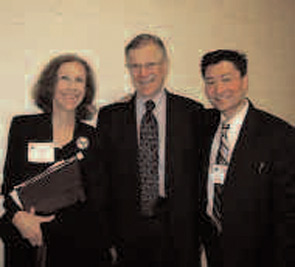On the second day of the fly-in, advocates loaded buses and flooded the steps of Capitol Hill—all wearing “No SGR” stickers to provide a visual aid for their meetings. Advocates representing 34 states met with their lawmakers to ask for their support of the four main issues affecting rheumatologists and their patients:
American College of Rheumatology (ACR) on Capitol Hill
From the College | Issue: May 2008 |
- A long-term solution to the flawed physician reimbursement formula: Lawmakers were told that physicians should be paid based on increases to the cost of practicing medicine and were asked to base physician payments on the Medical Economic Index and eliminate the SGR formula.
- The Medicare Fracture Prevention and Osteoporosis Testing Act of 2007: Lawmakers were encouraged to sign on in support of this legislation, which restores funding that is vital to preventative service in healthcare.
- The Arthritis Prevention, Control, and Cure Act of 2007: Lawmakers were asked to support this legislation, which would expand efforts to discover and implement new ways of preventing, treating, and caring for patients with arthritis and related rheumatic diseases.
- Support for arthritis and rheumatic disease research by increasing NIH funding: Lawmakers were asked to increase funding to federal programs engaged in vital research to combat arthritis and related diseases, which are essential to continuing the search for innovative treatments that can help millions of Americans live longer, healthier, and more productive lives.
By all accounts, the “Advocates for Arthritis” fly-in was a successful lobbying effort on behalf of the ACR and ARHP. Several lawmakers have taken immediate action in response to the February Hill visits, and participants felt like their message was heard. “Advocacy on the Hill was amazing,” says fly-in participant Barry Waters, MD. “The lectures were fantastic and the experience of lobbying was exhilarating. It was a perfectly assembled program and every ACR member should try to find time to participate in a future event. Sincerely, it was one of the highlights of my career as a rheumatologist.”
Outside of the effect the fly-in had on legislation, this year’s event was a success within the ACR by showing members to be passionate and willing to reach out on behalf of the rheumatology community. “It is certainly difficult to judge the success and impact we have on Congress, as it takes time for legislation to move,” explains ACR Government Affairs Specialist, Aiken Hackett. “More than tripling the event’s attendance in a two-year span is evidence that ACR and ARHP members are willing to get involved in advocacy activities and speak out on issues that affect them and their patients. This is the true success of this year’s fly-in.”

